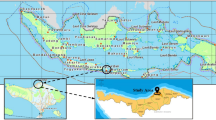Abstract
The increasing generation of solid waste and its improper management has imposed daunting impact on Kabul city. The city of 5 million people generated 3050 tonnes of solid waste every day in 2018. Data analysis shows that if an estimated 25% waste reduction is achieved gradually by 2023, then the total cost of the system will be reduced to 1505.9 million Afs/year, much lesser than the estimated cost at 2210 million Afs/year. This study was aimed at developing an integrated solid-waste management (ISWM) plan for Kabul city based on an overview of the existing system and practices, including the gaps in the entire value chain. The study recommends a paradigm shift from business-as-usual scenario to an ISWM approach. The proposed strategies, when implemented effectively, will increase the recycling rate and reduce the requirement for landfilling in Kabul city. Policy reforms to encourage waste reduction and segregation, and the establishment of facilities for recycling, treatment, and landfilling are proposed. Moreover, the willingness to pay of citizens indicates the total cost of waste management system, estimated at 111.53 million Afs/month, can be recovered effectively.









Similar content being viewed by others
References
Agamuthu P, Masaru T (2014) Municipal solid waste management in Asia and the Pacific Islands: challenges and strategic solution. Springer, Singapore
UNFPA and CSO (2007) Afghanistan—a socio-economic and demographic profile household listing 2003–2005, Kabul. https://afghanag.ucdavis.edu/country-info/files/all-Afghanistan.pdf. Accessed 22 May 2019
Haidaree G, Lukumwena N (2017) Solid waste management challenges and possible solution in Kabul city. Int J Environ Chem Ecol Geol Geophys Eng 11:262–266
Marshall RE, Farahbakhsh K (2013) Systems approaches to integrated solid waste management in developing countries. Waste Manag 33:988–1003
Shekdar AV (2009) Sustainable solid waste management: an integrated approach for asian countries. Waste Manag 29:1438–1448
Memon MA (2010) Integrated solid waste management based on the 3R approach. J Mater Cycles Waste Manag 12:30–40
Sahimaa O, Hupponen M, Horttanainen M, Sorvari J (2015) Method for residual household waste composition studies. Waste Manag 46:3–14
European Commission (EC) (2004) Methodology for the analysis of solid waste (SWA tool). 5th Framework Program, Vienna. https://www.wien.gv.at/meu/fdb/pdf/swa-tool-759-ma48.pdf. Accessed 22 May 2019
Central Statistic Organization (CSO) (2018) Analysis of population projections 2017–2018. http://cso.gov.af/en/page/demography-and-socile-statistics/demograph-statistics/3897111. Accessed 22 May 2019
Kaza S, Yao L, Bhada-Tata P, Van Woerden F (2018) What a waste 2.0: a global snapshot of solid waste management to 2050, urban development series. World Bank, Washington, DC. https://doi.org/10.1596/978-1-4648-1329-0
Kumar S, Smith SR, Fowler G, Velis C, Kumar SJ, Arya S, Cheeseman C (2017) Challenges and opportunities associated with waste management in India. R Soc Open Sci 4:160–764
PCD (2015) Thailand state of pollution report 2015. http://infofile.pcd.go.th/mgt/PollutionReport_en.pdf. Accessed 25 May 2019
Dung TNB, Sen B, Chen CC, Kumar G, Lin CY (2014) Food waste to bioenergy via anaerobic processes. Energy Proc 61:307–312
Leib EB, Balkus O, Rice C, Maley M, Taneja R, Cheng R, Civita N, Alvoid T (2016) Leftovers for livestock: a legal guide for using food scraps as animal feed. https://furtherwithfood.org/wp-content/uploads/2017/07/Leftovers-for-Livestock_A-Legal-Guide_August-2016.pdf. Accessed 22 May 2019
Jibril JD, Sipan IB, Sapri M, Shika SA, Isa M, Abdullah S (2012) 3Rs critical success factor in solid waste management system for higher educational institutions. Proc Soc Behav Sci 65:626–631. https://doi.org/10.1016/j.sbspro.2012.11.175
Sakai S, Yoshida H, Hirai Y, Asari M, Takigami H, Takahashi S, Tomoda K, Peeler MV, Wejchert J, Schmid-Unterseh T, Douvan AR, Hathaway R, Hylander L, Fischer C, Oh GJ, Li J, Chi NK (2011) International comparative study of 3R and waste management policy developments. J Mater Cycles Waste Manag 13:86–102. https://doi.org/10.1007/s10163-011-0009-x
Patel V, Meka S (2013) Forecasting of municipal solid waste generation for medium scale towns located in the state of Gujarat, India. Int J Innov Res Sci 2:4707–4716
Joseph K, Rajendiran S, Senthilnathan R, Rakesh M (2012) Integrated approach to solid waste management in Chennai: an Indian metro city. J Mater Cycles Waste Manag 14:75–84
Khajuria A, Yamamoto Y, Morioka T (2008) Solid waste management in Asian countries: problems and issues. WIT Trans Ecol Environ 109:643–653
Visvanathan C, Trankler J (2003) Municipal solid waste management in Asia: a comparative analysis. Presented at the national workshop on sustainable solid waste landfill management in Asia, Bangkok
Funding
The authors received no financial support for the research, authorship, or publication of this article.
Author information
Authors and Affiliations
Corresponding author
Ethics declarations
Conflict of interest
The authors declare no conflict of interest.
Additional information
Publisher's Note
Springer Nature remains neutral with regard to jurisdictional claims in published maps and institutional affiliations.
Rights and permissions
About this article
Cite this article
Khoshbeen, A.R., Logan, M. & Visvanathan, C. Integrated solid-waste management for Kabul city, Afghanistan. J Mater Cycles Waste Manag 22, 240–253 (2020). https://doi.org/10.1007/s10163-019-00936-z
Received:
Accepted:
Published:
Issue Date:
DOI: https://doi.org/10.1007/s10163-019-00936-z




